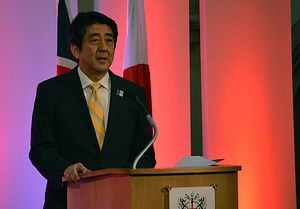Back in May, I wrote a piece entitled “To Lead in Asia, Japan Must Take China to Court.” The piece criticized Japan’s policy towards the Senkaku Islands dispute with China, which refuses to acknowledge that a dispute even exists. As a result, Japan isn’t able to try and use international law to strengthen its claim of sovereignty over the islands.
This is misguided on a number of levels. First, one of China’s major demands is that Japan acknowledge that a dispute exists. Of course, Beijing wants Japan to acknowledge the dispute because it believes that will strengthen its claims to the island. However, Beijing’s desire for Japan to admit a dispute exist also gives Tokyo leverage which it could use to get concessions from China. Furthermore, acknowledging a dispute would give Chinese leaders a way to dial down tensions without losing face.
After getting these concessions, Japan could also turn to international law to strengthen its sovereignty claims. Japan has administered the Senkaku Islands for decades and would almost certainly receive a favorable ruling from an international tribunal on the issue of sovereignty. If the South China Sea is any guide, China would refuse to participate in the proceedings or accept the court’s ruling. Still, the ruling would put China on the defensive since Japan could claim that it had the international community and international law on its side. This includes international law that derives from treaties that China is a party to.
Perhaps most importantly, these policies would strengthen Japan’s regional leadership claim. Turning the case over to an international tribunal would draw a stark contrast between Japan and China. Tokyo could credibly demonstrate that it is a responsible status quo power with peaceful intentions. Conversely, Tokyo could portray China as a irresponsible revisionist power.
These policies would also show Japan is willing to stick up to China. Many of China’s maritime sovereignty claims are based on vague histories and outdated maps. The more times international tribunals rule against these claims, the less credible they become. Thus, Japan would join the Philippines in creating a model that other states with competing sovereignty claims with China could replicate. Given Japan’s size and importance, its willingness to settle the issue through international law would significantly pressure to China to follow course. Beijing can claim the Philippines is only bringing it to court because its weakness precludes other options. That argument would be much less credible when applied to Japan.
As it turns out, while the Japanese government may disagree with me on these issues, the Japanese people do not. On Thursday, I highlighted some of the findings of the 10th Japan-China Public Opinion Poll, which was released this week. One aspect of the poll I didn’t mention was how much the Japanese respondents disagreed with Japanese foreign policy, particularly over the Senkaku Islands. To begin with, roughly half of the Japanese respondents felt that bilateral diplomacy was not being handled effectively, although they weren’t asked who was to blame for this.
More revealing, almost 65 percent of the Japanese respondents recognized that a territorial dispute with China exists over the Senkaku Islands. Less than 14 percent refused to recognize a territorial dispute exists. Equally important, when asked about how to handle the dispute, 48 percent of Japanese respondents endorsed the view that “both countries should promptly proceed toward negotiations in order to resolve their issues through peaceful means.” Among the Japanese respondents, this was the most popular resolution proposal of the five offered. The second most popular choice, supported by 41 percent of Japanese respondents, was that “the matter should be taken to the International Court of Justice to be resolved in accordance with international law.”
Neither of these options are possible given current Japanese policy. To be sure, Shinzo Abe has eagerly sought a summit with Xi Jinping, while Beijing has balked, but Tokyo’s refusal to recognize the territorial dispute prevents negotiations over the issue. Obviously, Japan can’t bring the issue before the ICJ without acknowledging that there is an issue in the first place.
On the other hand, the least popular proposals for the Japanese side were “in order to protect the territory, Japan should strengthen its effective control over it,” which less than 23 percent supported, and “the issue should be shelved over the long term and instead focus should be on joint development,” which was supported by under 9 percent of the Japanese people surveyed. These two proposals are also the closest to Japan’s current and former policies toward the dispute.
It’s worth noting that this is hardly an anomaly; in fact, it’s becoming the norm. For example, the Japanese public as a whole were against reinterpreting the constitution to allow for collective self-defense.
It seems somewhat paradoxical that, on a whole host of issues, but especially the Diaoyu/Senkaku Islands dispute, the Chinese people are far more supportive of their non-democratic government’s policies than the Japanese people are of their democratically elected government’s policies.
However, this is misleading in a number of ways. For instance, by controlling the press and limiting dissident, Beijing is able to control the narrative in China far more than Tokyo can control the narrative in Japan. Indeed, especially on foreign policy issues, elite opinion can have a large impact on public opinion. And while Shinzo Abe has to contend with a ton of elite criticism, it would be unthinkable for Chinese elites to slam the CCP’s position on territorial disputes.
Ultimately, one of the core differences between liberal democracies and most other forms of government is the degree to which opposing opinions are allowed and even encouraged. Thus, it would seem strange if there was not a more active and robust debate about important issues like the Senkaku Islands in Japan.

































